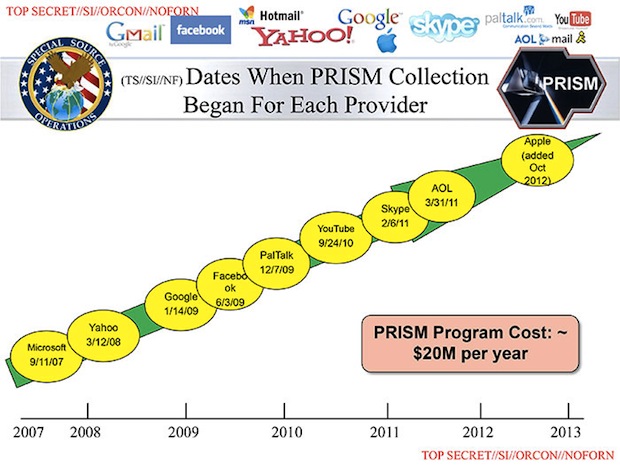Google and Facebook did not allow intelligence to directly access the servers, but created “secure portals” for it.

Nine companies, accused yesterday of participating in the PRISM data collection intelligence program, denied the allegations, saying they did not provide “direct access” to their servers. However, according to The New York Times, the whole thing is in the formulations.
According to The Verge with reference to The Times, in fact, the government turned to companies such as Google, Apple, Microsoft and Facebook, with the question of developing digital secure portals to which companies could transfer data and where they could get access government.
')
According to sources, Times, most of the companies mentioned initially resisted the implementation of such a service, but in the end, many of them agreed to participate to one degree or another (Twitter, as reported, refused to participate). Moreover, both Google and Facebook took part in the discussion of plans for the development of separate “secure portals” - and Facebook allegedly created such a system, despite the outraged post of Mark Zuckerberg .
Martin Dempsey, chairman of the Joint Chiefs of Staff (a body of the US Department of Defense), participated in the negotiations on the development of the systems that went on throughout the year. He came to Silicon Valley to meet with company executives.
As for the denials from the companies, many noted that the texts of the statements of Apple, Google and Facebook contained almost word for words. All of them claim that they have never heard of PRISM, that they do not provide direct access to their servers, and that they have obeyed certain judicial requests for information. Given the new revelations from The Times, these statements may well be technically true.
Companies may not have been aware of the name of the PRISM program when developing systems - and The Times reports that those who knew about the systems, in any case, pledged not to disclose information about them. A separate data repository is neither a “direct access” nor a “backdoor”, and the data transfer through these repositories will be conducted through access provided in response to specific requests under the Foreign Intelligence Surveillance Act.
According to The Times, last year, under the FISA law, more than 1,800 orders were issued, and in one such case, the NSA sent an agent to an unnamed company headquarters to monitor cyber attacks. There, the agent installed a program developed by the government on the company's server and downloaded the information in a few weeks to a laptop. The NSA, it is claimed, can also receive real-time data from companies upon request.
Source: https://habr.com/ru/post/182616/
All Articles